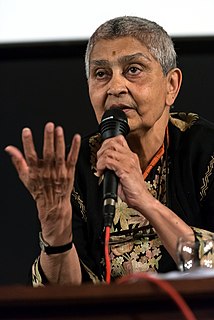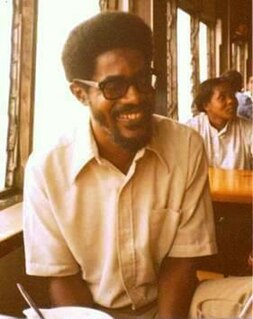
Colonialism is a practice or policy of control by one people or power over other people or areas, often by establishing colonies and generally with the aim of economic dominance. In the process of colonisation, colonisers may impose their religion, language, economics, and other cultural practices. The foreign administrators rule the territory in pursuit of their interests, seeking to benefit from the colonised region's people and resources. It is associated with but distinct from imperialism.

Imperialism is a policy or ideology of extending the rule over peoples and other countries, for extending political and economic access, power and control, often through employing hard power, especially military force, but also soft power. While related to the concepts of colonialism and empire, imperialism is a distinct concept that can apply to other forms of expansion and many forms of government.

Gayatri Chakravorty Spivak is an Indian scholar, literary theorist, and feminist critic. She is a University Professor at Columbia University and a founding member of the establishment's Institute for Comparative Literature and Society.

Walter Anthony Rodney was a prominent Guyanese historian, political activist and academic. He was assassinated in 1980.

Charles McLean Andrews was an American historian, an authority on American colonial history. He wrote 102 major scholarly articles and books, as well as over 360 book reviews, newspaper articles, and short items. He is especially known as a leader of the "Imperial school" of historians who studied, and generally admired, the efficiency of the British Empire in the 18th century. Kross argues:
Colonial cinema refers to the cinema produced by cinema of the colonizing nation in and about their colonies. While typically seen as a Western phenomenon, non-Western cases, most notably that of Imperial Japan, also had colonial cinemas. Colonial films typically idealized life in the colonies by emphasizing the modernizing aspects of colonization. Feature films set in colonial settings typically represented these parts of empire as refuges for colonizers looking to escape life in the metropole. As a result, colonial films frequently did not attempt to reflect the social realities of life in colonized countries. Representations of local characters, places, and customs were regularly presented as escapist, apologetic or overtly racist. Today colonial cinema is an important source to understand the mentality of the colonizing societies.

The American Journal of Mathematics is a bimonthly mathematics journal published by the Johns Hopkins University Press.

European colonialism and colonization was the policy or practice of acquiring full or partial political control over other societies and territories, founding a colony, occupying it with settlers, and exploiting it economically. For example, colonial policies, such as the type of rule implemented, the nature of investments, and identity of the colonizers, are cited as impacting postcolonial states. Examination of the state-building process, economic development, and cultural norms and mores shows the direct and indirect consequences of colonialism on the postcolonial states.

American Jewish History is an academic journal and the official publication of the American Jewish Historical Society. The journal was established in 1892 and focuses on all aspects of the history of Jews in the United States. The journal was formerly titled Publications of the American Jewish Historical Society and American Jewish Historical Quarterly. The current editors-in-chief of the journal are Kirsten Fermaglich, Adam Mendelsohn, and Daniel Soyer. Recent former editors include Dianne Ashton, Eric L. Goldstein, Eli Faber, Arthur A. Goren, and Marc Lee Raphael. The journal is published quarterly by the Johns Hopkins University Press.

Antony "Tony" Gerald Hopkins, FBA is a British historian specialising in the economic history of Africa, European colonialism, and globalisation. He is Emeritus Smuts Professor of Commonwealth History at the University of Cambridge and an Emeritus Fellow of Pembroke College, Cambridge.
Postcolonialism is the critical academic study of the cultural, political and economic legacy of colonialism and imperialism, focusing on the human consequences of the control and exploitation of colonized people and their lands. More specifically, it is a critical theory analysis of the history, culture, literature, and discourse of imperial power.

Jean Comaroff is Professor of African and African American Studies and of Anthropology, Oppenheimer Fellow in African Studies at Harvard University. She is an expert on the effects of colonialism on people in Southern Africa. Until 2012, Jean was the Bernard E. & Ellen C. Sunny Distinguished Service Professor of Anthropology and of Social Sciences at the University of Chicago and Honorary Professor of Anthropology at the University of Cape Town.
William Roger Louis CBE FBA, commonly known as Wm. Roger Louis or, informally, Roger Louis, is an American historian and a professor at the University of Texas at Austin. Louis is the editor-in-chief of The Oxford History of the British Empire, a former president of the American Historical Association (AHA), a former chairman of the U.S. Department of State's Historical Advisory Committee, and a founding director of the AHA's National History Center in Washington, D. C.
Michael Adas is an American historian and currently the Abraham E. Voorhees Professor of History at Rutgers University. He specializes in the history of technology, the history of anticolonialism and in global history.
Jack Philip Greene is an American historian, specializing in Colonial American history and Atlantic history.
Settler colonialism is a form of colonialism that seeks to replace the original population of the colonized territory with a new society of settlers. As with all forms of colonialism, it is based on exogenous domination, typically organized or supported by an imperial authority. Settler colonialism is enacted by a variety of means ranging from violent depopulation of the previous inhabitants to more subtle, legal means such as assimilation or recognition of indigenous identity within a colonial framework. Settler colonialism contrasts with exploitation colonialism, which entails a national economic policy of conquering a country to exploit its population as cheap or free labor and its natural resources as raw material. In this way, settler colonialism lasts indefinitely, except in the rare event of complete evacuation or settler decolonization.
Warwick Hugh Anderson, medical doctor, poet, and historian, is Janet Dora Hine Professor of Politics, Governance and Ethics in the Department of History and the Charles Perkins Centre, University of Sydney, where he was previously an Australian Research Council Laureate Fellow (2012–17). He is also honorary professor in the School of Population and Global Health, University of Melbourne. He is a fellow of the Australian Academy of the Humanities, the Academy of Social Sciences in Australia, the Australian Academy of Health and Medical Sciences and the Royal Society of New South Wales, from which he received the History and Philosophy of Science Medal in 2015. For the 2018–19 academic year, Anderson was the Gough Whitlam and Malcolm Fraser chair of Australian Studies at Harvard University. As a historian of science and medicine, Anderson focuses on the biomedical dimensions of racial thought, especially in colonial settings, and the globalisation of medicine and science. He has introduced anthropological insights and themes to the history of medicine and science; developed innovative frameworks for the analysis of science and globalisation; and conducted historical research into the material cultures of scientific exchange. His influential formulation of the postcolonial studies of science and medicine has generated a new style of inquiry within science and technology studies.
Anthony Dirk Moses is an Australian historian specializing in the history of genocide, and intellectual history. He is the Frank Porter Graham Distinguished Professor of Global Human Rights History at the University of North Carolina at Chapel Hill. He is widely regarded as a leading expert on the history of genocide and ethnic cleansing, and on the history of colonialism, especially genocide in colonial contexts. He is known for coining the term racial century in reference to the period 1850–1950. He is editor-in-chief of the Journal of Genocide Research.
J. Kēhaulani Kauanui is Kanaka Maoli woman born and raised in California with ties to family in Anahola on the island of Kaua`i and throughout the islands. She is an author, editor, radio producer, educator, serves on advisory boards, and is one of six co-founders of the Native American and Indigenous Studies Association (NAISA). She was awarded a Fulbright (1994-1995) at the University of Auckland in New Zealand where she was affiliated with the Māori Studies department. Her research areas focus on indigeneity & race, settler colonialism, decolonization, anarchism, and gender & sexuality.










